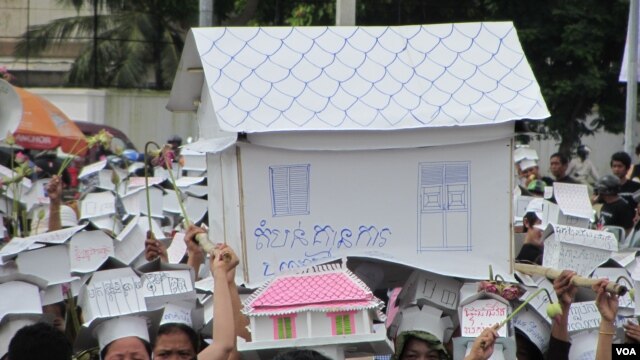12 April 2013
PHNOM PENH - The World Bank is under pressure to review some of its
policies around the world to ensure that in countries like Cambodia it
is not funding the wrong projects.
In a discussion at George Washington University this week, panelists said the World Bank is needed for international challenges of land tenure and food security.
But its policies in places like Cambodia have not always increased security for the people.
In Phnom Penh, a land titling program that went awry failed to protect thousands of residents from a commercial development around Beoung Kak lake. Demonstrators from forced evictions that began there in 2008 are still pushing to have some of their land returned.
Yun Mane, of the Cambodia Indigenous Youth Association, who attended the conference, said Cambodia’s 190,000 indigenous people, from 24 different clans, are facing hardships from economic land concessions granted by the government. The land concessions destroy the forest, endangering the traditional way of life for locals, from food gathering to spiritual rites, she said.
“So my hope is that the World Bank will be enforcing a safeguard policy in a real, practical way in the development process,” she said. “I hope that my voice will be heard by the development partners, for better solutions to address the land issues for indigenous people.”
The World Bank and other donors should provide more funding and technical assistance to help these groups, and others, obtain land titles and proper administration, she said.
A $28-million World Bank project for land titles in 2006 failed to give land titles to villagers at Boeung Kak. But Tep Vanny, an activist for evicted residents in that development project, said the Bank’s announcement to freeze aid in 2011 was effective in moving government policy.
Following the funding freeze, Prime Minister Hun Sen announced he would set aside more than 12 hectares for resettlement on the 133-hectare development. However, that land has not been fully given up to former residents. Critics fault local authorities for the failure.
“Today there remain only 61 families,” Tep Vanny told VOA Khmer. “The World Bank should find a strategy to put additional pressure to end the dispute, because now we are all facing serious living conditions—unsafe living conditions—and in practice we have subsequently been criminalized.”
Natalie Bugalski, a housing rights lawyer at Inclusive Development International, said thousands of Cambodians are still facing potential evictions. The World Bank’s safeguard review process should consider “this sort of fundamental challenge to the World Bank’s development model,” she said.
Bayron Milian, a regional planner and professor at the Peten University of San Carlos, in Guatemala, said the World Bank’s safeguards did not help with land titling problems in his country, either, leaving about a third of the people who needed titles without them.
The World Bank said in a statement this week that it is making efforts to improve land governance in countries where it provides funding and to protect the rights of land owners and small farmers, including women.
In a discussion at George Washington University this week, panelists said the World Bank is needed for international challenges of land tenure and food security.
But its policies in places like Cambodia have not always increased security for the people.
In Phnom Penh, a land titling program that went awry failed to protect thousands of residents from a commercial development around Beoung Kak lake. Demonstrators from forced evictions that began there in 2008 are still pushing to have some of their land returned.
Yun Mane, of the Cambodia Indigenous Youth Association, who attended the conference, said Cambodia’s 190,000 indigenous people, from 24 different clans, are facing hardships from economic land concessions granted by the government. The land concessions destroy the forest, endangering the traditional way of life for locals, from food gathering to spiritual rites, she said.
“So my hope is that the World Bank will be enforcing a safeguard policy in a real, practical way in the development process,” she said. “I hope that my voice will be heard by the development partners, for better solutions to address the land issues for indigenous people.”
The World Bank and other donors should provide more funding and technical assistance to help these groups, and others, obtain land titles and proper administration, she said.
A $28-million World Bank project for land titles in 2006 failed to give land titles to villagers at Boeung Kak. But Tep Vanny, an activist for evicted residents in that development project, said the Bank’s announcement to freeze aid in 2011 was effective in moving government policy.
Following the funding freeze, Prime Minister Hun Sen announced he would set aside more than 12 hectares for resettlement on the 133-hectare development. However, that land has not been fully given up to former residents. Critics fault local authorities for the failure.
“Today there remain only 61 families,” Tep Vanny told VOA Khmer. “The World Bank should find a strategy to put additional pressure to end the dispute, because now we are all facing serious living conditions—unsafe living conditions—and in practice we have subsequently been criminalized.”
Natalie Bugalski, a housing rights lawyer at Inclusive Development International, said thousands of Cambodians are still facing potential evictions. The World Bank’s safeguard review process should consider “this sort of fundamental challenge to the World Bank’s development model,” she said.
Bayron Milian, a regional planner and professor at the Peten University of San Carlos, in Guatemala, said the World Bank’s safeguards did not help with land titling problems in his country, either, leaving about a third of the people who needed titles without them.
The World Bank said in a statement this week that it is making efforts to improve land governance in countries where it provides funding and to protect the rights of land owners and small farmers, including women.


No comments:
Post a Comment